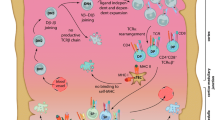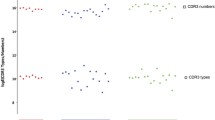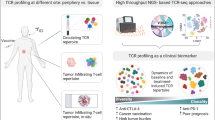Abstract
Tumors from colorectal cancer (CRC) are generally immunogenic and commonly infiltrated with T lymphocytes. However, the details of the adaptive immune reaction to these tumors are poorly understood. We have accrued both colon tumor samples and adjacent healthy mucosal samples from 15 CRC patients to study lymphocytes infiltrating these tissues. We apply a method for detailed sequencing of T-cell receptor (TCR) sequences from tumor-infiltrating lymphocytes (TILs) in CRC tumors at high throughput to probe T-cell clones in comparison with the TCRs from adjacent healthy mucosal tissue. In parallel, we captured TIL counts using standard immunohistochemistry. The variation in diversity of the TIL repertoire was far wider than the variation of T-cell clones in the healthy mucosa, and the oligoclonality was higher on average in the tumors. However, the diversity of the T-cell repertoire in both CRC tumors and healthy mucosa was on average 100-fold lower than in peripheral blood. Using the TCR sequences to identify and track clones between mucosal and tumor samples, we determined that the immune response in the tumor is different than in the adjacent mucosal tissue, and the number of shared clones is not dependent on distance between the samples. Together, these data imply that CRC tumors induce a specific adaptive immune response, but that this response differs widely in strength and breadth between patients.




Similar content being viewed by others
References
Mlecnik B, Bindea G, Pages F, Galon J (2011) Tumor immunosurveillance in human cancers. Cancer Metastasis Rev 30:5–12
Burnet FM (1970) The concept of immunological surveillance. Prog Exp Tumor Res 13:1–27
Gooden MJ, de Bock GH, Leffers N, Daemen T, Nijman HW (2011) The prognostic influence of tumour-infiltrating lymphocytes in cancer: a systematic review with meta-analysis. Br J Cancer 105:93–103
Mlecnik B, Tosolini M, Kirilovsky A, Berchuck A, Bindea G et al (2011) Histopathologic-based prognostic factors of colorectal cancers are associated with the state of the local immune reaction. J Clin Oncol 29:610–618
Pages F, Galon J, Fridman WH (2008) The essential role of the in situ immune reaction in human colorectal cancer. J Leukoc Biol 84:981–987
Arstila TP, Casrouge A, Baron V, Even J, Kanellopoulos J et al (1999) A direct estimate of the human alphabeta T cell receptor diversity. Science 286:958–961
Robins HS, Campregher PV, Srivastava SK, Wacher A, Turtle CJ et al (2009) Comprehensive assessment of T-cell receptor beta-chain diversity in alphabeta T cells. Blood 114:4099–4107
Findeisen P, Kloor M, Merx S, Sutter C, Woerner SM et al (2005) T25 repeat in the 3′ untranslated region of the CASP2 gene: a sensitive and specific marker for microsatellite instability in colorectal cancer. Cancer Res 65:8072–8078
Tikidzhieva A, Benner A, Michel S, Formentini A, Link K-H et al (2012) Microsatellite instability and beta2-microglobulin mutations as prognostic markers in colon cancer: results of the FOGT-4 trial. Br J Cancer 106:1239–1245
Halama N, Zoernig I, Spille A, Michel S, Kloor M, Grauling-Halama S et al (2010) Quantification of prognostic immune cell markers in colorectal cancer using whole slide imaging tumor maps. Anal Quant Cytol Histol 32:333–340
Halama N, Michel S, Kloor M, Zoernig I, Benner A et al (2011) Localization and density of immune cells in the invasive margin of human colorectal cancer liver metastases are prognostic for response to chemotherapy. Cancer Res 71:5670–5677
Halama N, Zoernig I, Spille A, Westphal K, Schirmacher P, Jaeger D et al (2009) Estimation of immune cell densities in immune cell conglomerates: an approach for high-throughput quantification. PLos One 4:e7847
Yousfi Monod M, Giudicelli V, Chaume D, Lefranc MP (2004) IMGT/JunctionAnalysis: the first tool for the analysis of the immunoglobulin and T cell receptor complex V-J and V-D-J JUNCTIONs. Bioinformatics 20(Suppl 1):i379–i385
Conover WJ, Johnson ME, Johnson MM (1981) A comparative study of tests for homogeneity of variances, with applications to the outer continental shelf bidding data. Technometrics 23:351–361
Shannon CE (1948) A mathematical theory of communication. Bell Syst Tech J 27:379–423
Akolkar PN, Gulwani-Akolkar B, McKinley M, Fisher SE, Silver J (1995) Comparisons of T cell receptor (TCR) V beta repertoires of lamina propria and peripheral blood lymphocytes with respect to frequency and oligoclonality. Clin Immunopathol 76:155–163
Gulwani-Akolkar B, Akolkar PN, McKinley M, Fisher SE, Silver J (1995) Crohn’s disease is accompanied by changes in the CD4+, but not CD8+, T cell. Clin Immunol Immunopatholal 1:95–106
May E, Lambert C, Holtmeier W, Hennemann A, Zeitz M et al (2002) Regional variation of the α/β T cell repertoire in the colon of healthy individuals and patients with Crohn’s disease. Hum Immunol 65:467–480
Stumpf M, Hasenburg A, Riener MO, Jutting U, Wang C et al (2009) Intraepithelial CD8-positive T lymphocytes predict survival for patients with serous stage III ovarian carcinomas: relevance of clonal selection of T lymphocytes. Br J Cancer 101:1513–1521
Wiech T, Nikolopoulos E, Hausmann M, Walch A, Werner M et al (2008) A case of heterogeneous breast cancer with clonally expanded T-Cells in the HER2+. Breast J 14:487–491
Goodell V, Waisman J, Salazar LG, de la Rosa C, Link J et al (2008) Level of HER-2/neu protein expression in breast cancer may affect the development. Mol Cancer Ther 7:449–454
Ochsenreither S, Fusi A, Wojtke S, Busse A, Nussler NC et al (2010) Comparison of T-cell receptor repertoire restriction in blood and tumor tissue of colorectal cancer patients. Journal Transl Med 8:35
Robins H, Srivastava S, Campregher P, Turtle C, Andriesen J et al (2010) Overlap and effective size of the human CD8+ T cell receptor repertoire. Sci Transl Med 2:ra64
Conflict of interest
Anna Sherwood, Ryan Emerson, and Cindy Desmarais have employment and stock options at Adaptive Biotechnologies. Harlan Robins has consults for Adaptive Biotechnologies and owns stock. Dominique Scherer, Nina Habermann, Katharina Buck, Jürgen Staffa, Niels Halama, Dirk Jaeger, Peter Schirmacher, Esther Herpel, Matthias Kloor, Alexis Ulrich, Martin Schneider, Cornelia M Ulrich declare that they do not have any conflict of interest.
Author information
Authors and Affiliations
Corresponding author
Additional information
Anna M. Sherwood, Ryan O. Emerson, and Dominique Scherer contributed equally to this work.
Cornelia M. Ulrich and Harlan Robins contributed equally to this work.
Electronic supplementary material
Below is the link to the electronic supplementary material.
Rights and permissions
About this article
Cite this article
Sherwood, A.M., Emerson, R.O., Scherer, D. et al. Tumor-infiltrating lymphocytes in colorectal tumors display a diversity of T cell receptor sequences that differ from the T cells in adjacent mucosal tissue. Cancer Immunol Immunother 62, 1453–1461 (2013). https://doi.org/10.1007/s00262-013-1446-2
Received:
Accepted:
Published:
Issue Date:
DOI: https://doi.org/10.1007/s00262-013-1446-2




